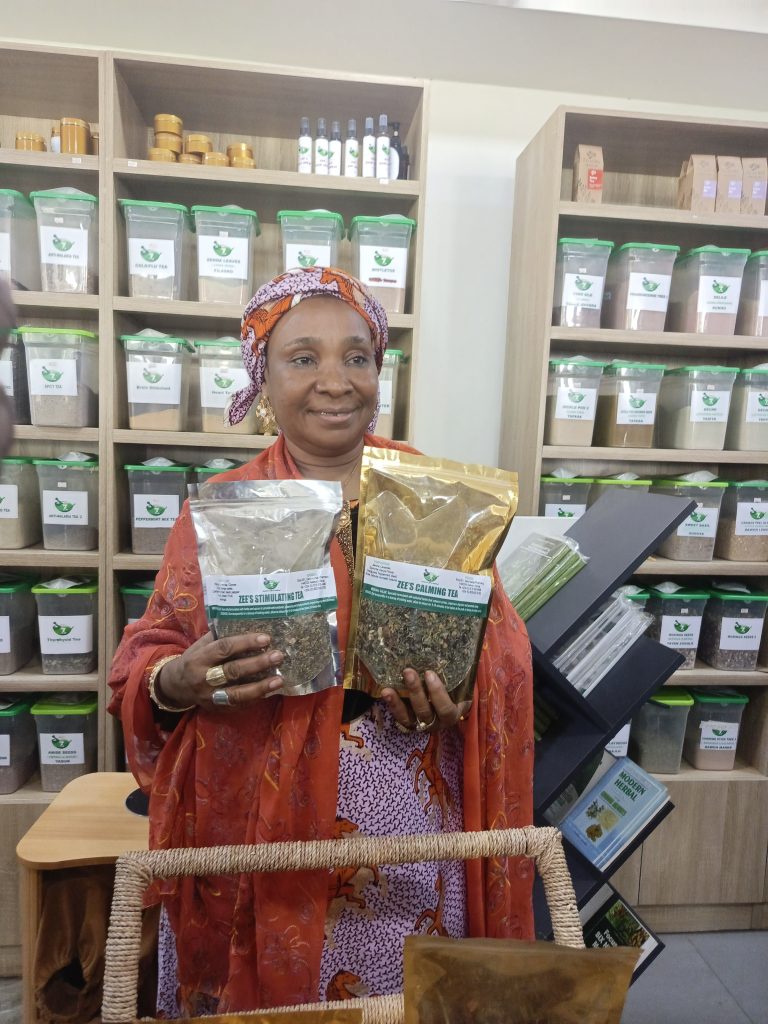A walk into Zee’s Herbal Pharmacy in Abuja gives one the ambience of Africaness, a feeling of being at home ,especially being welcomed with one of the specially brewed spiced traditional tea that warms your throat and tantalize your tongue, one would have the eagerness to explore the pharmacy to know what it has to offer.
Jars and jars of fruits, plants, spices and herbs are packaged and labelled neatly on the shelves. The contents in the jar are both for the treatment of various sicknesses and the pleasure of the body and mind.
As Africans, we have been blessed with abundant natural resources, including medicinal plants and herbs that have been used for centuries to treat various ailments. However, despite this rich heritage, we continue to rely heavily on imported raw materials and medicines, neglecting our own traditional medicine.
Pharmacist Zainab Ujudud Shariff, the Proprietor of Zee Herbal Pharmacy, and Professor Martins Emeje, DG/CEO of the Nigeria Natural Medicine Development Agency (NNMDA), are among the few who have recognized the importance of traditional medicine and are advocating for its development and promotion.

The duo who are both prominent advocates for traditional medicine allude that it is not just a cultural practice but a vital part of our healthcare system.
According to Shariff, “Traditional medicine is part of our culture, and it is here to stay. We need to accept it and promote it,” Emeje adds, “Africans were healing themselves long before the colonial masters came. We need to decolonize our minds and take ownership of our health resources.”
Read Also: NiMet forecasts 3-day sunshine, haziness from Monday
The statistics are staggering. Over 80 per cent of people in rural areas rely on traditional medicine, and Nigeria alone has over 10,000 species of medicinal plants, with only a fraction of them documented and utilized. The African continent has been endowed with an array of natural resources, including the baobab tree, neem trees, and hibiscus, which have numerous medicinal properties.

However, despite this wealth of resources, Nigerians continue to neglect our traditional medicine. We prioritize imported medicines and raw materials, often at the expense of our own local content. This is not only detrimental to our health but also to our economy. Shariff aptly says, “If we develop our own traditional medicine, we will create jobs, reduce our reliance on imported medicines, and promote our culture.”
So, what is the way forward?
First, there is a need for Nigerians to acknowledge the importance of traditional medicine and recognize its value in its healthcare system. Secondly, there is the need to invest in research and development, documenting and standardizing the country’s medicinal plants and herbs.
Thirdly, there is the need to promote traditional medicine through education and awareness, encouraging people to embrace it as a viable healthcare option. Finally, there is the need to support local content and promote policy changes that favour the development of traditional medicine.

The Africa Diseases Prevention and Research Development Initiative (ADRAF) organized a six-week fellowship programme for Journalists, the Africa Disease Reporting Fellowship (ADReF) to look into tackling biases often associated with disease reportage in Africa.
The fellowship had 13 health and science journalists from Nigeria, Liberia, Ghana, Burundi, Kenya and Rwanda for its take-off. The six-week fellowship which began on March 18th and ended on April 28th, 2024 had a five-week intensive online session and one-week physical immersion programme held in Abuja.
The Fellows were lectured on several topics including tackling misinformation, disinformation and fake news in health reporting, reporting during health and humanitarian crises, and Africa’s major diseases and health challenges. The Journalists were also taken through courses on how to dismantle collaboration barriers between journalists and scientists and create stories from research and other scientific publications.
ALSO READ FACT-CHECKED VIEWPOINT: Honeybees aren’t disappearing and GMOs do not cause colony collapse disorder
The traditional medicine Practitioners pointed out that journalists have a critical role to play in changing the narrative of Nigerians and Africans about traditional medicine. They urged the journalists to report on the successes and achievements of traditional medicine, highlighting its benefits and impact.
The need to be deliberate in their reporting, recognizing the power of their words and the influence they have on their readers was emphasized. By doing so, the journalists can help promote traditional medicine and contribute to the development of the continent’s healthcare system.
Traditional medicine is not just a relic of the past; it is a vital part of Nigeria’s present and future. The people need to embrace it, promote it, and develop it. As Africans, we have the power to take ownership of our health resources and create a better future for ourselves. Let us rise to the challenge and make traditional medicine a priority.


